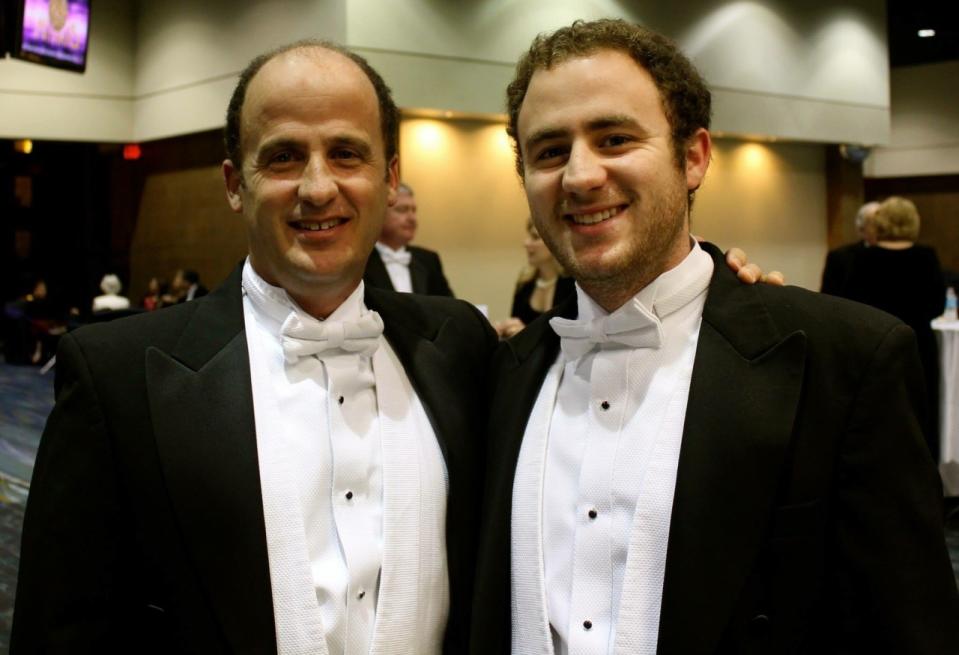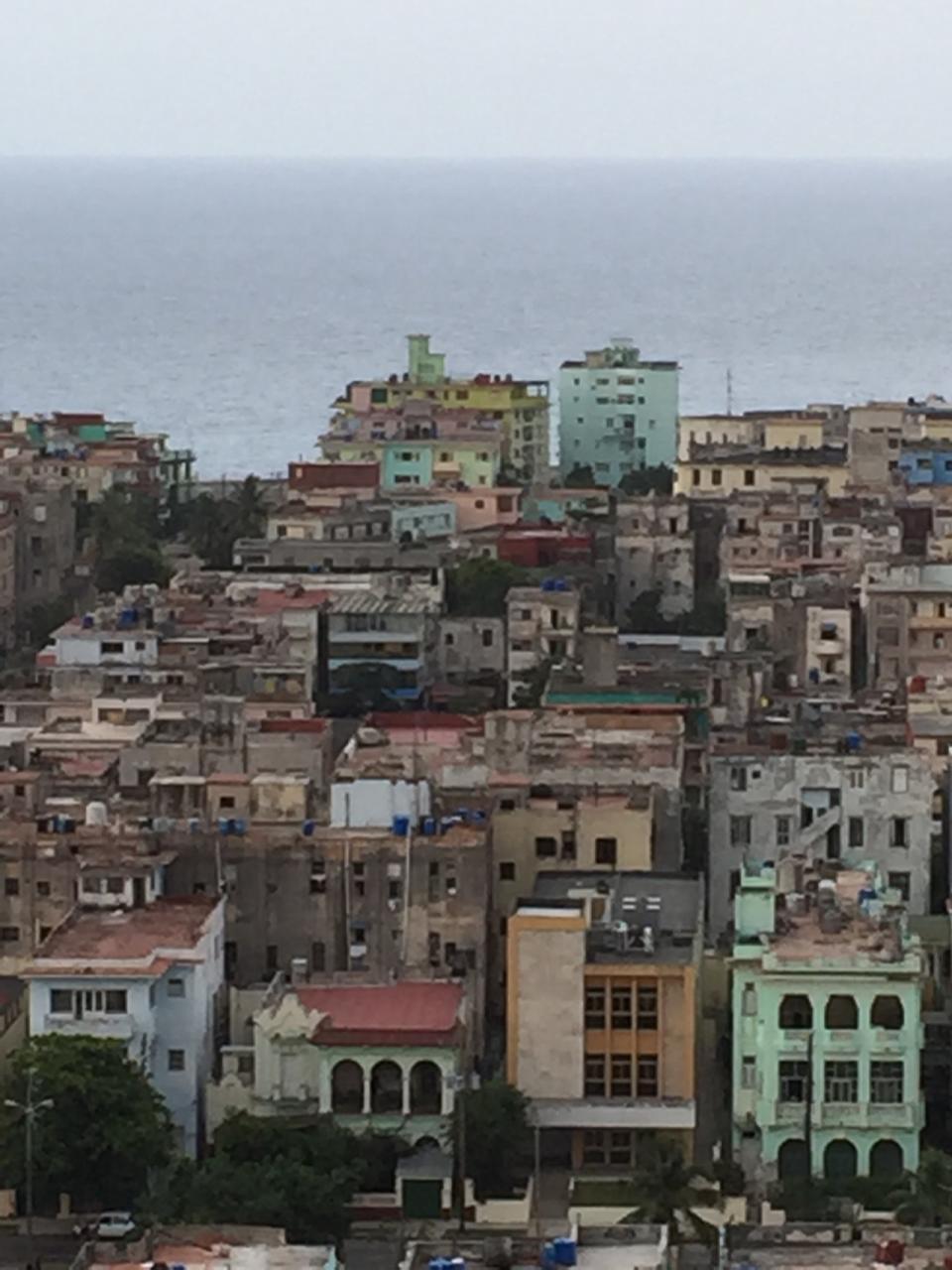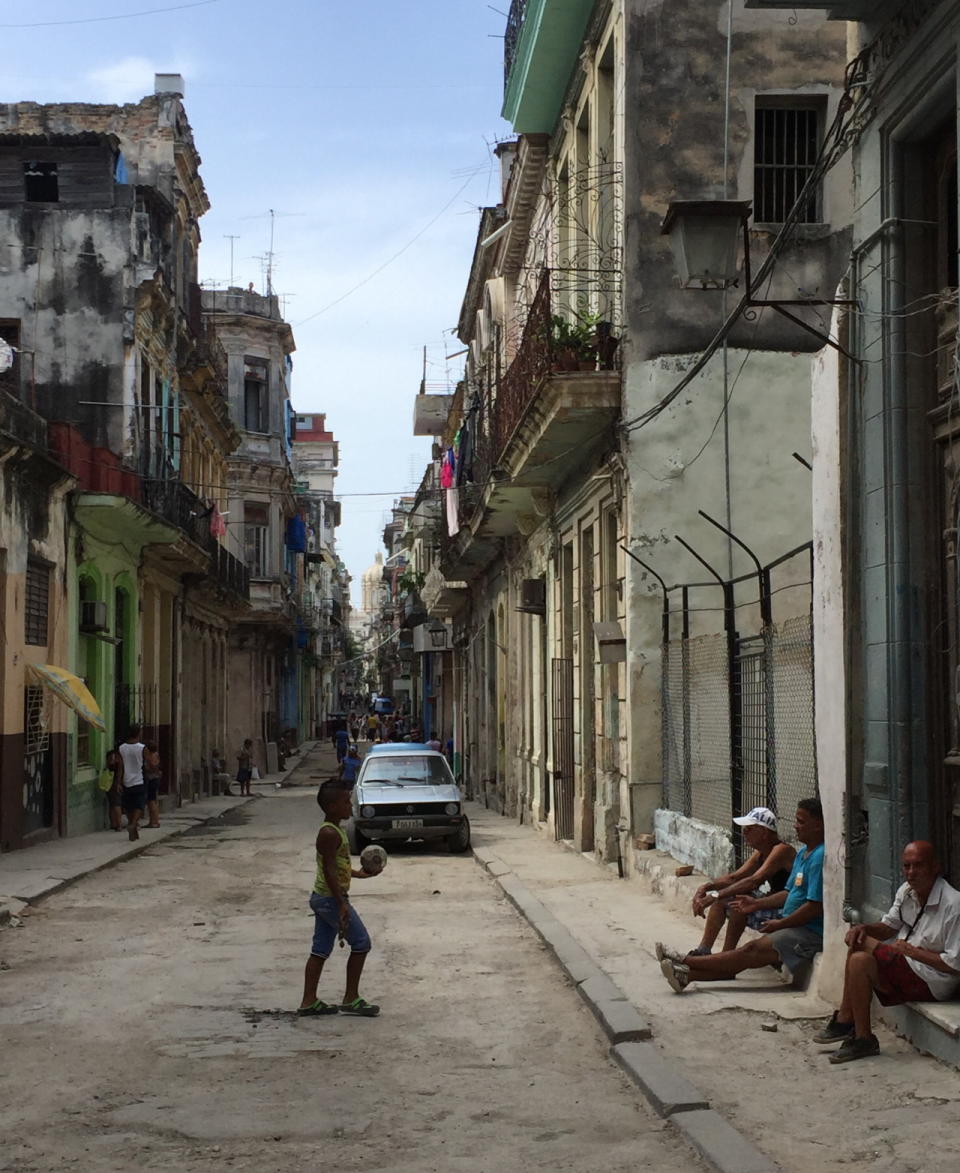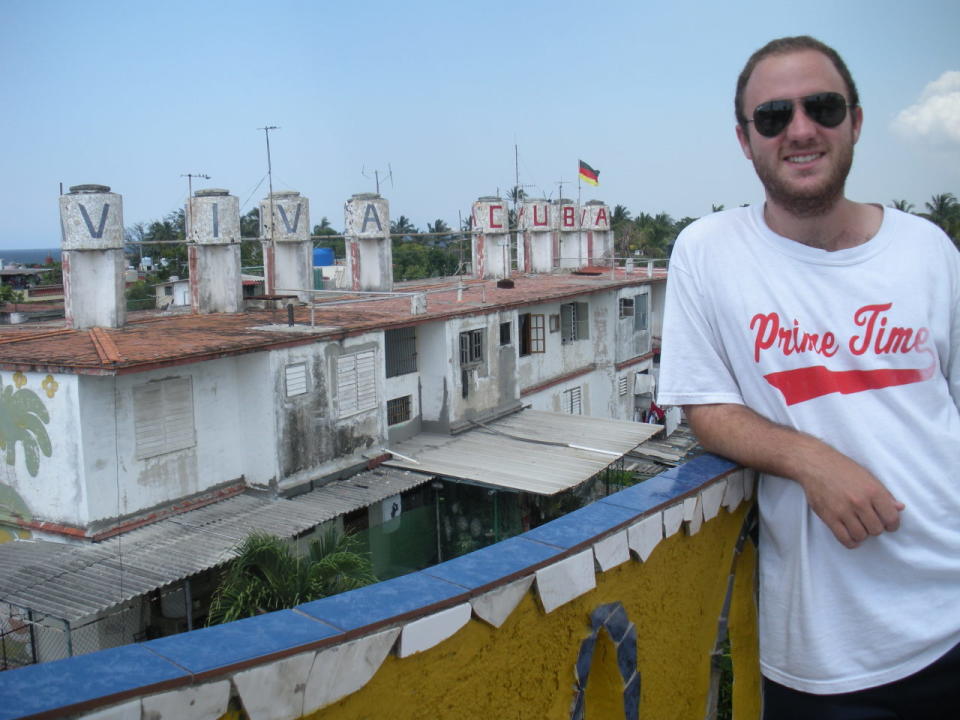Perfect Storm Reunites Family in Cuba After a Lifetime Apart

Miguel Soler should have been born in Cuba. World events decreed otherwise. It would take 52 years and the perfect storm of startling opportunities to enable him to reunite with his family a mere 90 miles off American soil in his cultural homeland: Cuba.
His parents never planned to leave Cuba. They met young, fell in love, and married when she was 20 and he was 23. She was the girl from across the island with family in sugar and tobacco. He was a Havana city boy who dreamed of being a doctor. That dream, and the start of their life together, came to an abrupt halt after Fidel Castro took power.
STORY: Meet Hurricane Katrina’s ‘Youngest Survivor’
After years of failed attempts, Castro overthrew President Fulgencio Batista in 1959 and became prime minister of Cuba. Over the next two years, he enacted sweeping, unilateral change. With each new reform, Miguel’s parents saw another part of their dream die.
STORY: Man Reunites with Siblings After 40 Years, Discovers They’d Met Before
First, Castro closed the medical school where Miguel’s father was studying to be a doctor. Miguel’s father put his dream aside. People who protested Castro’s reforms wound up in jail, first by the hundreds and then the thousands. Better to keep one’s head down. He began studying economics at night while he worked during the day to support his family.
Next, Castro nationalized foreign assets, abolishing private businesses, redistributing wealth, and establishing Soviet-inspired collective farms. “My father had gone to work in his father’s business,” Miguel tells Yahoo Parenting. “It was a huge import-export brokerage that started in Spain. It was very successful in Cuba.”
He pauses. “Until Castro took it all.”
On Dec. 18, 1961, 11 days after their second child was born, the Solers boarded a plane out of Havana. They carried their son, Javier, aged 11 months, and the new baby, a little girl named Laura. They took only what they could carry. They left behind everything else. Their home. Their livelihood. Their friends. Their family. Miguel’s parents would never see their homeland again.

Miguel Soler and his son Cristian Miguel. Both took trips to Cuba, their homeland, on separate occasions. (Photo: Miguel Soler)
Many Cuban immigrants fleeing Castro settled in Miami, as close as possible to the island. Miguel’s parents chose differently. They found their American home in New Orleans, a port city laced with Spanish, French, Latin American, and African connections. Miguel was born in New Orleans two years later, in November 1963. His younger sister Ana arrived in 1967, and his sister Teresa in 1970.
The Solers’ early years were lean in money and rich in Cuban community. Miguel’s father re-enrolled in medical school, working two jobs to pay bills. Miguel and his siblings learned Spanish as a first language, ate traditional foods, and grew up in a world shaped by New Orleans’s Cuban refugee community. “There was an active group of Cubanos profesionales in New Orleans. Everyone knew everyone else growing up. On Sunday afternoons, Cubans would come over or we’d go to them, and on holidays we do the cochon pig roast.” As a child, Miguel loved listening to traditional music that permeated the house and playing dominoes with old Cuban men who visited on the weekends.
As he grew older, he learned to maneuver life in ways common to children of immigrants. At school, he learned English and made American friends. At home, he spoke Spanish and listened to Cuban music. His heritage shaped his life, but visiting the island wasn’t on his mind. He was busy. His parents never went back. Cuban culture was everyday, but Cuba the island felt far away.
But in 2014, everything changed.

Havana (Photo: Miguel Soler)
First, in the spring, he received a call from his college-aged son, Cristian Miguel, named for his father and grandfather before him. Like his father, Cristian connected with his Cuban heritage. As a student at Louisiana State University (LSU), Cristian chose international relations with a focus on Latin America as a major, with minors in Spanish and business.
Out of the blue, he called his father “and he says, ‘Dad, guess what? LSU is going to Cuba!’” Miguel was dumbstruck. “I couldn’t believe it. I said immediately, ‘Of course, of course you must go.’”
Cristian felt similar urgency. “I had the sense that if I [went] on the LSU trip to Cuba, I would have a better understanding of my roots,” he tells Yahoo Parenting. “I would also get a sense of where my path in life should be headed. First, there is a certain excitement and attractiveness about visiting a country where many people are not able to or don’t want to visit … and the possibility to meet family members most of my immediate family had never met was very exciting.”

Havana (Photo: Miguel Soler)
In 1960, Castro nationalized all American assets in Cuba without payment to their owners. In response, President John F. Kennedy placed an embargo on all exports to Cuba, minus food and medicine. For over 50 years, American citizens had almost no contact with Cuba. In 2011, the Obama administration eased restrictions slightly by introducing a “people-to-people” travel rule. It allowed “purposeful” travel, such as that for approved humanitarian or academic reasons.
Thus in the summer of 2014, when he was just 20 years old, Cristian became the first member of his family to reunite with Cuban relatives in over half a century. “I remember feeling as if I was at a family gathering in the United States because they kept feeding me and feeding me, making sure my glass was refilled. This really put me at ease because I didn’t think I had anything in common with these family members.”
It didn’t take long to feel comfortable. “I knew that one of the family members, my great-aunt Fela, had pretty much raised my grandmother, who lives in New Orleans and who I am close to,” Cristian says. “It was nice to see where my grandma’s fiery, hilarious attitude came from. … I realized that family is family no matter the distance between us.”
Four months after Cristian returned full of stories, a second bombshell dropped: President Obama had made history by reestablishing economic ties with Cuba.
After a lifetime stateside, “I knew then,” said Miguel. “It was time.”
In June 2015, Miguel and his sister Ana made their own history. They became the first family members to travel to Cuba after the sanctions lifted. They traveled along with their family friend Carolina Caballero, a professor at Tulane University. Carolina had led a summer study-abroad program in Cuba since 2012. Her expert knowledge would prove invaluable as the Solers navigated the country.
Miguel was specific about his hopes for the trip. “I didn’t want go to see opportunities for tourists, to live in a hotel world separate from the Cuban people. I wanted to experience it as someone coming back home.”
From the moment they set down on Cuban soil, emotions ran high. “Everywhere we went, people were joyful to receive us, greeting us like old friends, and making every effort possible,” he remembers. The siblings flew first to Camaguey, where Carolina had family. “We pulled into this old 1950s housing project,” Miguel remembered. “People poured out to greet us. The wife, she was a doctor. She fixed the kind of meal they have only once month, special meat dishes, sides, dessert, and everyone eating and laughing, and we had music, dancing, everything. Their love, the spirit of the people, their generosity in the face of having so little … it was overwhelming.”
From Camaguey, they drove through the countryside to Havana, where they eschewed hotels to stay with a Cuban family in a casa particular, a private home. Anxious to reunite with his own family, Miguel called a family member his son had visited, the son of the aunt with whom Miguel’s mother had been very close.

Cristian Miguel in Havana. (Photo: Cristian Miguel Soler)
“Immediately, he picked us up in his little Russian car, brought us all over to the house. There we met my mother’s abuela, her beloved aunt Fela. She lived at the house, not a nursing home. They took incredible care of her, incredible, better care than anyone else or than you see at a nursing home. She was 95 years old. She actually passed not long after we left. I got to meet her. I got to tell her about my family and our lives. This is a gift I will never forget.”
Although Miguel always had questions about Cuba, his mother preferred to focus on the future, not the past. His cousin Argeo was eager to ensure Miguel and his sister had the full family experience and to fill in those gaps. During their trip, Argeo, Miguel, and Ana spent hours driving around Havana, visiting with people, seeing family landmarks, and absorbing Cuban life.
“He showed us my father’s family neighborhood, and then took us to the church where my parents got married,” Miguel tells Yahoo Parenting. “It was incredible — incredible. I get emotional just remembering it.” He remembers each detail with love. “The church was built by the Spaniards, for Spaniards to get married in, specifically Spaniards from Barcelona. When we walked inside, there was a little old Cuban man working there, the caretaker of the church. He showed us the registry books our parents would have signed when they got married. He also showed us how the numbers of baptisms and weddings declined after 1961, because of Castro not allowing people to have religious freedom.”
From his cousin, he learned his parents’ move to the United States was not the first time politics forced his family to seek a safe haven. His father’s family fled from Spain to Cuba after Franco took power when his father was 3 years old. His father was the youngest of 13 children. He father grew up in Havana and learned the family business. This helped him stay connected to siblings who had remained in Spain.
“They had a big sugar and coffee brokerage, a large company that did well,” Miguel says. “That’s also how he met my mother.” His mother, the only girl in a family with four brothers, was born in the western port city of Manzanillo, known for sugar, tobacco, and coffee crops. After Castro assumed power, both families scattered, some going to Spain and others to sister Latin American countries.
Argeo himself had seen the world as a ship captain, Miguel and his sister learned. He could have left Cuba but never did. “I felt like we connected on that — that choice not to leave when it seems like you should,” Miguel says. He and his family chose to stay in New Orleans after losing their home and everything in it during Hurricane Katrina. Miguel knew what it was like to make choices others didn’t understand.
“How many times was I asked, ‘Why do you live in New Orleans after Katrina?’ Like me, Argeo could have left. But it’s hard to leave everything you know. Your family. You lose everything, but you stay. … He felt the same way about Cuba.”
This vibrant, and often contradictory, culture of life in Cuba defined the sights and people they saw. He and Ana reveled in meals with family that brought back the flavors of their childhood in New Orleans. They saw the famous singer Pedro Luis Ferrer sing in an old smokestack made into a nightclub, just after the censor lifted restrictions on what he could say. The crowd laughed and cried as Ferrar crooned songs of Cuban troubles, of love, and of hope.
They observed displaced upscale establishments for tourists set in the middle of disheveled downtown Havana. “You’d go around a corner and spot bars or restaurants that looked right out of the Upper East Side of New York — or the Upper West Side. Whatever is the rich side,” Miguel added with a laugh. They couldn’t help but compare tourist opulence to the poverty of so many homes. “In the casa, the house, we had mango — mango everywhere, eggs and ham — and yet, it’s so poor. The country itself is so poor.”
Their trip lasted 10 days, but it could never be enough to make up for all those years. “I will definitely go back,” Miguel tells Yahoo Parenting.
Cristian feels the same. “I would like to say that Cubans deserve all the respect in the world for what they have been through and the strong, positive attitude that they continue to have.”
As he imagines future trips, Miguel offers a happy ending for this half-decade-old story. “Who knows, maybe next time we can all go together as a family!” For in the end, family is what it’s all about for the Solers.
Read more of Sara Hudson’s writing at Words From Little Bird.
Please follow @YahooParenting on Facebook, Twitter, Instagram, and Pinterest. Have an interesting story to share about your family? Email us at YParenting (at) Yahoo.com.


